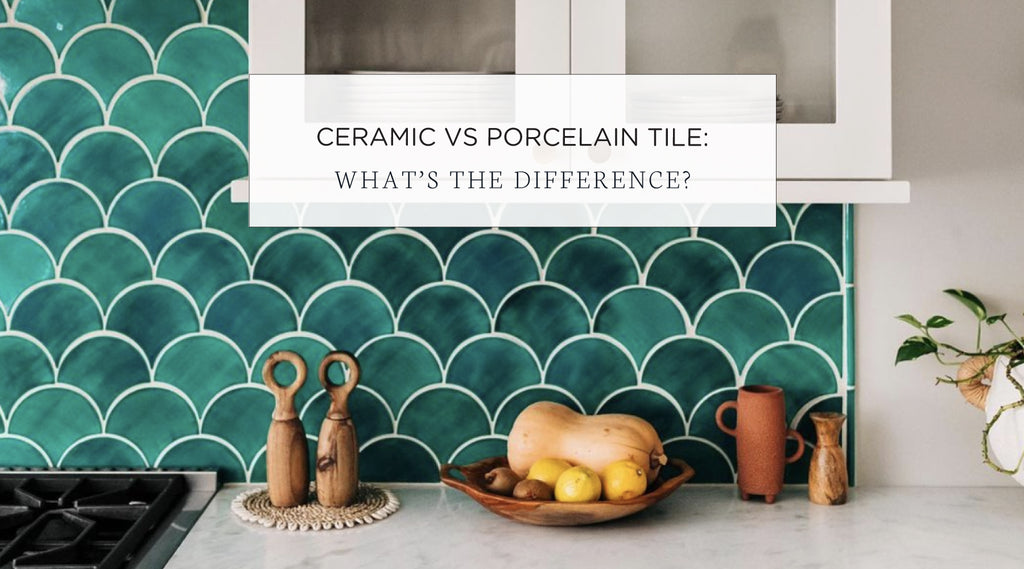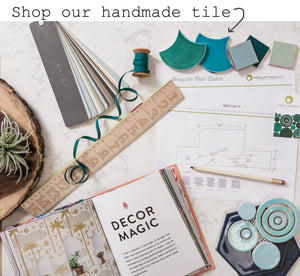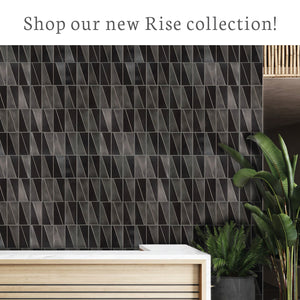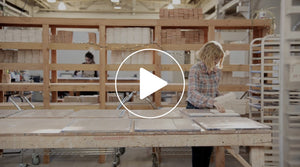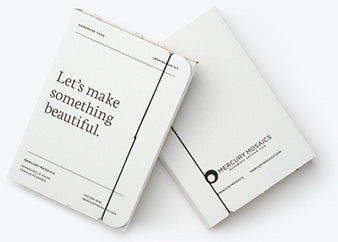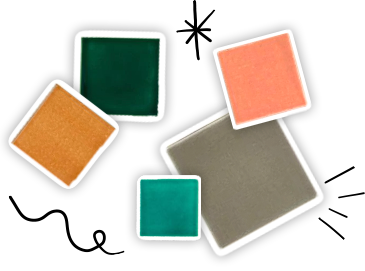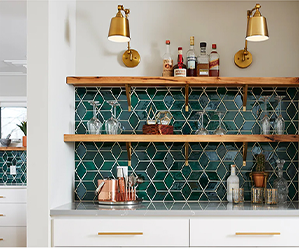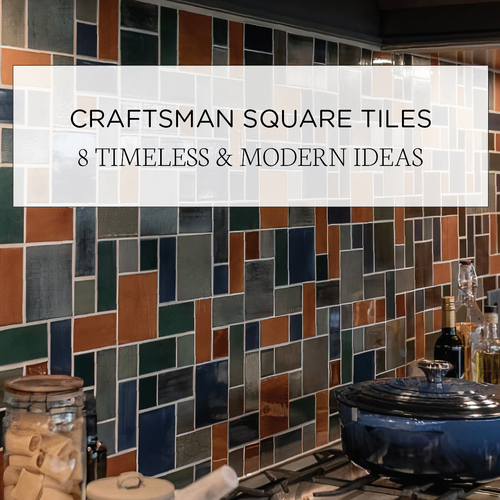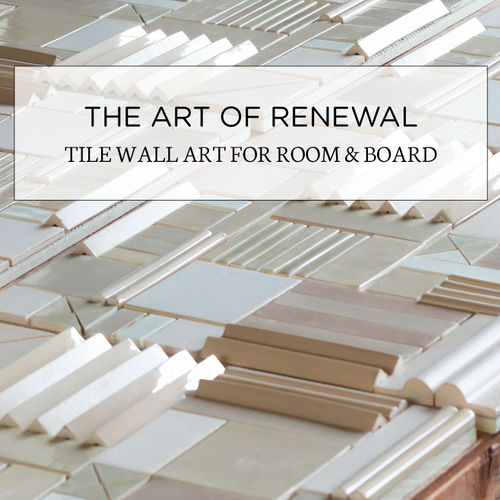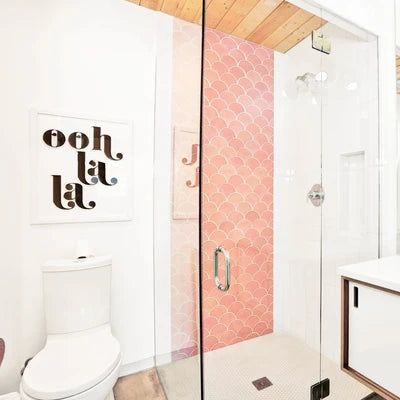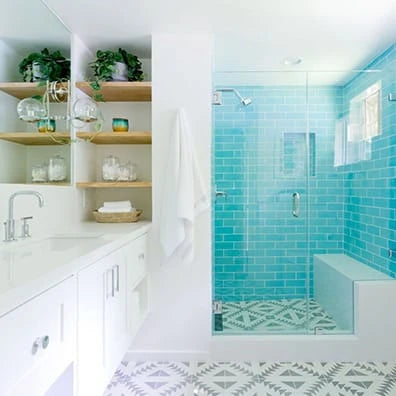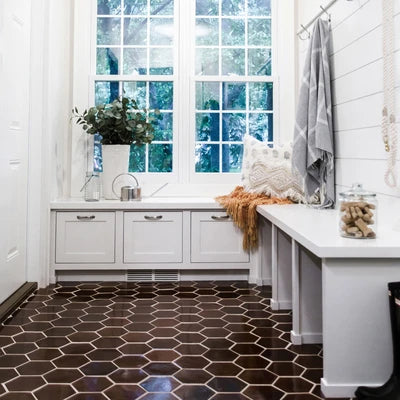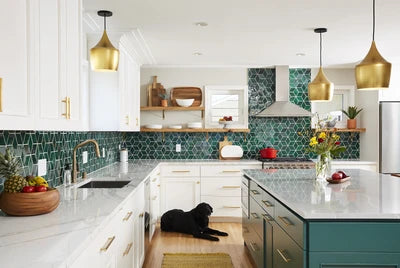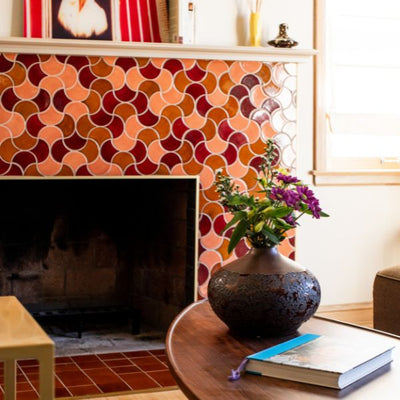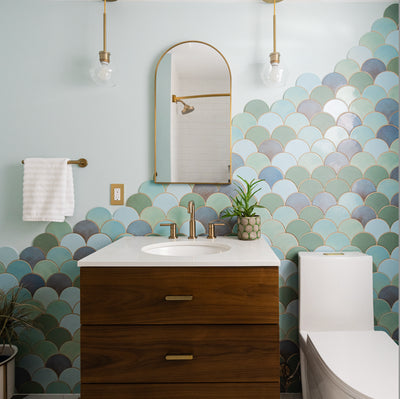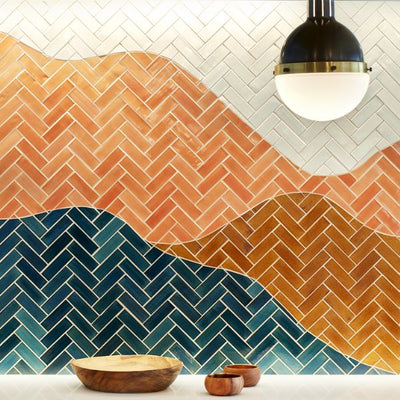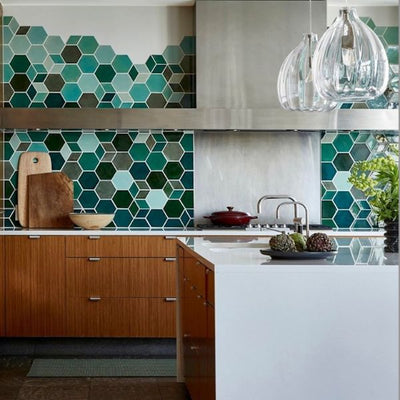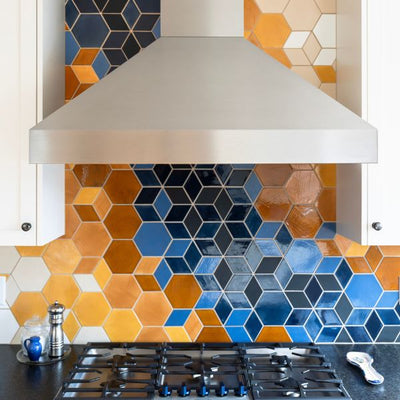If you’re a homeowner or business owner exploring tile options for your space, you might be feeling a bit overwhelmed with the options. Ceramic vs. porcelain tile, in particular, can be confusing to understand and difficult to discern which is best for you.
We’re here to explore some common ceramic vs. porcelain topics like their key characteristics, the pros and cons of each, and how to choose ceramic or porcelain tile for your next project.
- Understanding Ceramic Tile
- Understanding Porcelain Tile
- 5 Differences
- Ceramic Pros & Cons
- Porcelain Pros & Cons
- How to Choose

Understanding Ceramic Tile
Ceramic and porcelain tiles are both made from clay and fired in a kiln, but the differences lie in the exact composition of the material used and the temperature at which the tiles are fired. The resulting tiles have different properties and benefits, making porcelain and ceramic suitable for their unique purposes throughout the home.
Manufacturers mix clay, sand, and feldspar with water to create ceramic tiles, then press and shape them into tile shapes. After a drying period, they are fired in a kiln to harden. Ceramic tile can either be left unglazed for a rustic look or glazed to add a layer of color and sheen.
Understanding Porcelain Tile
When comparing porcelain vs. ceramic tile, one technicality to keep in mind is that porcelain is a type of ceramic tile. So are porcelain and ceramic the same? Not quite. Porcelain, like ceramic, is made from clay and fired in a kiln to harden.
Porcelain differs from ceramic in that it is made with finer clay and fired at higher temperatures. Is porcelain tile durable? Even more durable than ceramic. The result of the firing process in conjunction with the composition of the tile leads to a greater-density product that is harder, less porous, and more durable.
Like ceramic tile, porcelain can be either glazed or unglazed depending on the desired result.

3"x8" Subway Tile - Bluegrass
Interior Design by Workroom C
Photography by Eric Zepeda
Explore Mercury Mosaics sample packs to experience the look, and feel the difference of handmade artisan tiles for your mid-century modern designed home.
Ceramic vs. Porcelain: 5 Differences
Porcelain tile vs. ceramic tile comes down to two things: material composition and the kiln temperature during the manufacturing process. These two seemingly small changes produce two tiles with distinct traits.
The extreme temperature and finer clay mixture of porcelain tile make it more durable and water resistant. On the other hand, the hardness of porcelain tile means it’s more difficult to cut and install, and often more expensive. Both porcelain and ceramic tile are great options with pros and cons for each, but the choice between them will ultimately come down to your project and the needs of the space.
Durability and Wear Resistance
While both ceramic and porcelain tiles are durable and resistant to wear and tear, they each have areas they perform better in.
Consider the space and how you use it when deciding between ceramic floor tile and porcelain floor tile. For areas like the mud room or kitchen that get lots of traffic, you may opt for a more durable tile like porcelain. For areas like a laundry room or half bathroom, ceramic floor tile will do the trick. For kitchen backsplashes, the lightness and ease of installation make ceramic tile the perfect choice.
Water and Stain Resistance
When comparing the water and stain resistance of ceramic and porcelain tile, porcelain can be the better choice. Glazing ceramic tiles makes the difference less noticeable, except in outdoor environments where the back of ceramic tiles can get wet. For showers, bathroom floors, mudrooms, and other areas, either tile is a great option based on your overall needs.
Alternatively, a combination of fine clay and extremely high kiln temperatures results in a hard material that makes porcelain nearly impervious to water and extra stain and odor-resistant. If you’re tiling outdoor spaces like patios or walkways, opt for porcelain for its freeze-and-thaw resistance, lessening the likelihood of cracking from water getting in.

Aesthetic Considerations
For aesthetic considerations, ceramic tile offers the widest range of options. With an endless color palette, from deep jewel tones to vibrant oranges and reds, you’ll be sure to find the perfect shade for your space. And if you are looking for a more natural look, go with an unglazed tile for a raw matte finish.
The softer nature of ceramic tile also means you have a variety of styles and shapes to choose from, whether you’re looking for a traditional subway tile, Moroccan fish scales, or penny rounds. With porcelain tile, you’ll also find a good variety of colors to suit many design aesthetics, and they can even mimic natural stone or wood.
Installation and Maintenance Considerations
Although the toughness and durability of porcelain tile make it an excellent option for flooring indoors and out, it also has its drawbacks. Cutting porcelain tile requires specific tools and is much harder, while ceramic tile can be cut with a basic tile cutter.
If you’re up for the job, ceramic tile with interlocking mesh makes a great DIY project. If you’re using porcelain you’ll probably want to call in the professionals. In terms of maintenance, the higher porosity of ceramic tile can make it slightly more susceptible to staining and bacteria, potentially necessitating more frequent cleaning.
Cost Comparison
Cost is an important factor in any home improvement project. When deciding between ceramic vs. porcelain floor tile, you can expect ceramic to be the more cost-effective option, which is why it’s a popular choice for homeowners on a budget. Porcelain tiles are more expensive upfront but offer greater longevity and durability, which can mean lower costs in the long run.
Don’t forget to consider installation costs when you are budgeting your project. Your installation expense will usually be higher with porcelain because of the hardness of the material and the precision required. The good news is that both tile options are relatively low maintenance and easy to clean with the right tools.

Large Hexagons - Vermont Pine
Photography by Sage E Imagery
Styling by Creekwoodhill
Building & Remodeling by Black Dog Homes
Learn how artisan-crafted, handmade tiles like the ones from Mercury Mosaics can outshine and outlast machine alternatives.
Pros and Cons of Ceramic Tiles
Ceramic tiles offer many advantages that make them a practical choice for home improvement projects, from colorful backsplashes to mid-century modern accent pieces. Ceramic tiles are an affordable option available in endless colors, styles, and finishes to match your design needs. They are durable, moisture-resistant, and easy to maintain.
Of course, there are disadvantages to ceramic tile as well. Compared to porcelain tiles, they are less durable and have a higher porosity, making them slightly more prone to chipping, cracking, and staining over time. They can also be quite cold on your feet compared to other flooring options.
Pros
Given the many advantages of ceramic tile, it’s no wonder that it’s a favorite option for home improvement projects small and large. They are highly cost-effective, provide endless aesthetic possibilities, and are easy to clean and maintain. The wide array of colors, finishes, and shapes available make it possible to create a truly custom tile design for your space without the high cost. Their easy installation makes it a great choice for DIYers looking to enhance the functionality and design appeal of their homes.
- Lower cost: Compared to other tile options, ceramic tile and installation expenses are lower on average.
- Easy to install: Ceramic tile can be installed using basic tile cutters, making it a great DIY option.
- Design versatility: The options are endless in terms of color, finish, shape, and pattern of ceramic tile to match the needs of your space.
- Low maintenance: Maintenance is simple and cleaning is a breeze with ceramic tile.
Cons
Despite their huge popularity, ceramic tiles do have some drawbacks that are worth considering. Because of their slightly softer nature, they are more susceptible to wear and tear, especially in areas of high use. They have less resistance to water than other tile options, which makes them prone to staining and water damage, especially if the tiles aren't sealed or installed properly.
Depending on the area you are tiling and the needs of the space, you may want to look at other tile options.
- More porous: Less dense than other tile options, ceramic tile absorbs water more easily and can also let in stains and bacteria.
- Less durable: Over time, ceramic tile is more likely to chip and crack, especially in areas with heavy traffic.
- More frequent cleaning: Since ceramic is less dense and prone to staining, you may have to clean more often.
- Cold on the feet: Without in-floor heating, ceramic tile can get cold on your feet, especially in colder climates.

Picking out the perfect grout color for your tile project is the first step in ensuring your design stays sharp for years to come.
Porcelain Tiles Pros and Cons
Porcelain tile is a premium option for both residential and commercial spaces, especially in higher-traffic areas. They are extra durable, have superior water resistance, and have plenty of design options to meet the needs and aesthetics of your space. When comparing ceramic floor tile vs. porcelain floor tile, the durability and longevity of porcelain can’t be matched.
Of course, drawbacks to porcelain tile are worth considering. Porcelain tile is more expensive in terms of material and also installation. Its density makes it a heavy and more challenging material to work with, which can drive up installation time and expenses.
Pros
The higher firing temperature of porcelain tile results in a dense and highly durable product that is more resistant to wear and tear over time. If you’re deciding between ceramic vs. porcelain flooring, porcelain is your best bet for longevity.
This denseness means it is nearly entirely water resistant, making it a perfect option for bathrooms, kitchens, and other areas likely to get wet. You can even use them outdoors for patios or walkways no matter the climate. Water won’t get in and therefore you don’t have to worry about it freezing and causing cracks. Just like ceramic tile, porcelain is available in many design options and can also mimic stone or wood.
- Low water absorption rate: The denseness of porcelain means it is nearly impervious to water, making it a great option for areas prone to getting wet.
- Super durable: The hardness of porcelain makes it less likely to chip, dent, or scratch over time.
- Easy to clean: The smooth surface and low porosity make it less likely to stain and easier to clean.
- Suitable for outdoor use: Even in extreme climates, porcelain is suitable for outdoor use because of its super low water absorption rate.
Cons
Although people consider porcelain tile the premium option, they should keep some disadvantages in mind. They are more costly compared to ceramic tile and other flooring options and often require expert installers equipped with extremely precise cutting tools.
Their density makes them heavy and thus harder to transport and cut. Unless you are an experienced tile DIYer, you’ll want to leave porcelain tile installation up to the professionals. For those seeking a cost-effective and simple installation, porcelain might not be the right choice.
- More costly: You can expect to pay more for porcelain tiles and also installation.
- Harder to install: Installing porcelain tiles requires expertise and precise tools for cutting, making DIY more challenging.
- Heaviness: The denseness of porcelain makes the tiles very heavy and challenging to transport and install on your own.
- Cold on the feet: As with ceramic tile, porcelain can be cold on the feet without in-floor heating, especially in colder climates.

2”x6” Herringbone Pattern - Grey, White, Deco White
Interior Design & Photography by Joinery & Design Co
From floor to ceiling, find inspiration from Mercury Mosaics gallery of handmade tiles to brighten any space.
How to Choose Ceramic vs. Porcelain Tile
So is porcelain or ceramic tile better? Now that you understand the key characteristics and pros and cons of each, you know that there is no right answer to this question. It will depend on a variety of factors, including the needs of the space, installation environment, longevity needed, and your project budget.
First and foremost, the specific needs of your space should drive your decision-making process. Consider the location of the tile, how much traffic or use it will get daily, and whether or not you need to account for water. Weighing these factors upfront will help you select the right tile option for your space and ensure it holds up over time.
- Needs of the space: is the tile for the floor, backsplash, or more decorative? Is the area heavily trafficked? Is there potential for lots of water or moisture? The answers to these questions will guide you to the best tile option for the space
- Installation complexity: if you are planning on a DIY install, opt for ceramic tile and make sure the space is easy to access and you have the appropriate tools
- Longevity: if you need the tile to hold up for decades and especially if it will be installed in high-traffic areas, porcelain will be the best choice
- Budget: consider both materials and installation expenses when factoring your budget, as well as any tools and equipment you’ll need if you plan to do a DIY install
Design with Distinction: Mercury Mosaics Handcrafted Ceramic Tiles
Whether you choose ceramic or porcelain for your next project, both are good quality options that are relatively easy to maintain and come in a variety of styles and colors to suit your unique taste and design aesthetic. Compared to natural stone options like slate or marble, ceramic and porcelain are less delicate and more versatile. Ceramic tile in particular is easy to work with and can be installed in several settings. Add some flair to your space with creative tile transitions and unique accents to make it truly yours.
Here at Mercury Mosaics, we’re passionate about tile and how it can transform your space. Our ceramic tiles are all produced by hand by artisans, resulting in a one-of-a-kind look and feel to each one. Shop our collection of ready-to-ship tiles today, or contact us for a free quote or design consultation.


